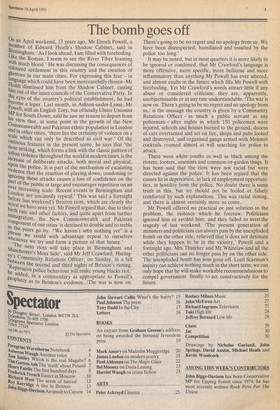The bomb goes off
C)11 an April weekend, 13 years ago, Mr Enoch Powell, a m i ember of Edward Heath's Shadow Cabinet, said n Birmingham: 'As I look ahead, I am filled with foreboding. Likeke the Roman, I seem to see the River Tiber foaming With much blood.' He was discussing the consequences of coloured settlement in this country and the creation of ghettoes in our main cities. For expressing this fear — in language which could have been more carefully chosen—Mr Heath dismissed him from the Shadow Cabinet, casting Intn out of the inner councils of the Conservative Party. In ,the eyes of the country's political establishment, he had become a leper. Last month, in Ashton-under-Lyme, Mr Powell, still an English Tory, but officially Ulster Unionist his for South Down, said he saw no reason to depart from um view that, at some point in the growth of the New Commonwealth and Pakistan ethnic population in London and in other cities, 'there lies the certainty of violence on a scale which can only be described as civil war.' Of the ominous features in the present scene, he says that 'the most striking, which forms a link with the classic pattern of nrhan violence throughout the world in modern times, is the increase of deliberate attacks, both moral and physical, Upon the police. It is part of the mechanism of escalating 'Polence that the reaction of playing down, condoning or Ignoring these attacks causes a loss of confidence on the Part of the public at large and encourages repetition on an ever increasing scale. Recent events in Birmingham and ndon are uncannily typical.' This was said a fortnight before last weekend's Brixton riots, which are clearly the ,w,orst we have seen yet. Mr Powell argued that, due to their oirth, rate and other factors, and quite apart from further Immigration, the New Commonwealth and Pakistan c°111Ponent of our cities 'is destined to double and to treble as. the years go by. "We haven't seen nothing yet" is a __Phrase we could with advantage repeat to ourselves whenever we try and form a picture of that future.' The next riots will take place in Birmingham and i„ fichester's Moss Side', said Mr Jeff Crawford, HaringLY s Community Relations Officer, on Sunday, in a lull rstween the second and third nights of Brixton's rioting. epressive police behaviour will make young blacks riot,' ne added, in a commentary as appropriate to Powell's Prophecy as to Brixton's evidence. 'The war is now on. There's going to be no regret and no apology from us. We have been disrespected, humiliated and insulted by the police too long.' It may be noted, but in most quarters it is more likely to be ignored or condoned, that Mr Crawford's language is more offensive, more specific, more bellicose and more inflammatory than anything Mr Powell has ever uttered, and almost exults in the future which fills Mr Powell with foreboding. Yet Mr Crawford's words attract little if any abuse or considered criticism; they are, apparently, unobjectionable or at any rate understandable. 'The war is now on. There's going to be no regret and no apology from us,' is the message the country is given by a Community Relations Officer — as much a public servant as any policeman — after nights in which 150 policemen were injured, schools and houses burned to the ground, dozens of cars overturned and set on fire, shops and pubs looted and destroyed, and organised gangs armed with Molotov cocktails roamed almost at will searching for police to attack.
There were white youths as well as black among the rioters, looters, arsonists and common-or-garden thugs. It has been said that the riots were not racial but were directed against the police. It has been argued that the causes lie in deprivation, in lack of employment opportunities, in hostility from the police. No doubt there is some truth in this, but we should not be fooled or falsely comforted by' such explanations. This was racial rioting, and there is almost certainly more to come.
Mr Powell offered no practical or just solution to the problem, the violence which he foresaw. Politicians ignored him or reviled him; and they failed to avert the tragedy of last weekend. 'The present generation of ministers and politicians can always pass by the unexploded bomb on the other side, relieved that it does not detonate while they happen to be in the vicinity,' Powell said a fortnight ago. Mrs Thatcher and Mr Whitelaw and all the other politicians can no longer pass by on the other side. The unexploded bomb has now gone off. Lord Scarman's inquiry can achieve nothing much in the short term; we can only hope that he will make workable recommendations to compel government finally to act constructively for the future.






































 Previous page
Previous page